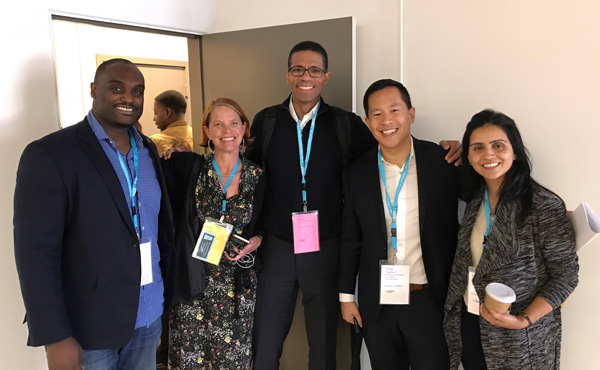Entrepreneurs of color are largely underrepresented and underfunded today. As part of the Racial Equity content track at SOCAP17, the session Building a Pipeline for Racial Equity focused on ways we can cultivate and accelerate inclusive entrepreneurship to change that paradigm. Tony Tolentino, Vice President of Blackstone Charitable Foundation, moderated a discussion among panelists Cliff Barber, CEO of Chicago Mezzanine Fund, Humaira Faiz, Director of Impact Investing at Arabella Advisors, and Emile Cambry, Founder of Blue1647, a Chicago based entrepreneurship and technology innovation center.
Here are a few major takeaways from their conversation at SOCAP17, a list of resources and programs that will help you learn more about the hurdles that entrepreneurs of color face today, and ways you can get involved with the movement to build the pipeline for racial equity.
Three Major Challenges
Session moderator Tony Tolentino organized the conversation around three of the biggest challenges faced by entrepreneurs of color, including the funding gap, lack of widespread representation of entrepreneurs of color, and the need for adequate support systems to catalyze the work of underrepresented entrepreneurs.
Tolentino observed that expanding the representation of who can be an entrepreneur will require dismantling widespread stereotypes. He said, “I think many folks, when they think of an entrepreneur, they think of a young white guy.” Cliff Barber added that this challenge will require overcoming “myths about marginalized communities that were decades in the making.” He suggested that widespread sharing of stories and data that demonstrate the true “range and tapestry and landscape of black owned businesses across the United States” is one path to creating change. “There has been a perception,” Barber said, “that the only businesses that black entrepreneurs run are local shops in low growth industries…In fact if you look at the nature of entrepreneurs, black and hispanic entrepreneurs tend to have attributes that are very similar to their white counterparts. But these are the sorts of things that people can’t see until they see the data.”
The panel also discussed what kinds of support systems would be most beneficial for diverse entrepreneurs. Tolentino asked, “once you engage folks from various communities, particularly people of color and women, how then do you build the right programs and the right support systems to ensure that those entrepreneurs and their ventures are successful?” The resources list at the end of this post includes reports, case studies, and programs that panelists pointed to as examples of what is working today and potential models that others can build upon in the future.
The third major challenge the panel discussed was related to funding, and specifically the people who are making decisions about who gets funded and who doesn’t. Tolentino said that this issue was quickly identified as one of the the biggest barriers faced by entrepreneurs of color today. Humaira Faiz of Arabella Advisors, said that she believes that the funding community has a significant opportunity to lead the change. She said that all too often when she meets with groups of investors she is, “the only woman, person of color, or both.” She identified that there is a lot of energy committed to this issue, but a long way to go, and everyone involved needs to “have more awareness of who is in the room representing communities that are disproportionately affected.” Barber agreed. “For funders there has to be more intentionality about who makes decisions so that we get people who don’t all think the same sitting at the table…you are only going to get new ideas if you invite people who have different experience and potentially more community based experience.”
“What progress do you hope to see within the next 10 years?”
“I don’t think there is one silver bullet answer, but I am hopeful that in another ten years that everyone who is in this space working towards various solutions will have built a much more inclusive ecosystem for entrepreneurs from all backgrounds.”
Tony Tolentino
“From my perspective, the charge would be to make sure that we are all continuing to think about all the different ways institutional barriers are facing the community of color and other marginalized entrepreneurs and how to overcome those. If we can go to a place where, in ten years, that education is embedded, we’ll have hopefully moved on to a much more equitable funding system. At Arabella, we’ve already seen our clients making huge progress on this in grantmaking and impact investing and are excited to continue this important work.”
Humaira Faiz
“We have to come up with a solution that allows a larger group of people to contribute. I think that people will pay a little bit more if they know that their money was going toward a system that is really, truly supporting a community.”
Emile Cambry
“I am launching my own impact investing fund Mezzanine Credit to grow companies that will create jobs for people in poor neighborhoods. As we surround ourselves with talent to build this project, mostly Millennials who are in business school right now, it has warmed my heart to see the number of people who have a personal double bottom line. These are mainstream business school students who are looking to do something that is going to provide a social return. To me, that signals that there is change afoot. If I think about a decade from now when more of those people are in leadership positions – they’ll be running Fortune 500 companies. They’ll be running companies like mine which are overtly double bottom line. But I think that signals a change when we bring the mainstream capitalist world into a way of thinking that is different from mine or the generation before me. That is going to usher in a new world, a new way of thinking, a new kind of capitalism that people have been talking about.”
Cliff Barber
What Call to Action Would You Issue to the SOCAP Community?
“Specifically to the angel investor and VC community, I would say change your perspective on who an entrepreneur is. To the folks who are providing capital, change what you think of when you think of entrepreneurs–not only in terms of race, but also of gender and geography. There is a bias toward only funding companies in the Bay Area and New York and Boston. I think we need to do a better job as a community to acknowledge there are profitable and investable businesses run by women, and members of communities of color, and entrepreneurs located all across the country, not only in a few major cities on the coasts.”
Tony Tolentino
“For the funders in the audience, they have an incredible power to lift and enable underserved entrepreneurs and marginalized communities better. Whether that’s by hiring people that reflect the communities they serve, by changing standard practices to recognize implicit biases and structural barriers, and by elevating and advancing these issues for the field. ”
Humaira Faiz
“SOCAP does a really good job of coalition building and bringing a wide variety of people together, not only across the US, but across the world. The more this becomes an internationally integrated effort, the more power it can have. I think SOCAP is the right platform for that…but the question is, how do you get the message out to people who are not already on board? The fund that I am launching now, I still knock on a lot of doors of pension funds and fund to funds, and I say ‘look I’ve got this double bottom line fund. We are aiming for positive funds for investors but we have this social return objective.’ So many times there is just an automatic door slam. I’m told that these two are separate–that it’s never going to happen. There is still a lot of work to be done to get people to think differently.”
Cliff Barber

Emile Cambry, Cari Hanson (SOCAP), Cliff Barber, Tony Tolentino, and Humaira Faiz at SOCAP17 (Photo courtesy of Blackstone Charitable Foundation)
Resources, Case Studies, Programs and Examples
- Creating Viral Impact in Black Communities Through Small Business Expansion, by Cliff Barber for the Expanding Black Business Credit Initiative (EBBC). This report highlights emerging opportunities to create wealth in under-served communities through small business expansion.
- Building Inclusion from the Inside-Out: A Brief Case Study, by Sampriti Ganguli & Graham Murphy, Stanford Social Innovation Review
- A Checklist of Potential Actions: Incorporating Diversity, Equity, and Inclusion (DEI) In Your Grant-Making Process, Compiled by Nancy Chan and Pamela Fischer
- Eliminating Implicit Bias in Grantmaking Practice, by Nancy Chan & Pamela Fischer, Stanford Social Innovation Review
- Blue1647 is seeking Business Mentors and Code Coaches to advise and instruct the entrepreneurs they serve. If you are interested, you can fill out and submit an application form here.
- Blackstone Charitable Foundation recently made a new commitment to inclusive entrepreneurship as part of their entrepreneurship initiative. This year the organization launched The Blackstone Inclusive Entrepreneurship Challenge. The BX Challenge provides grant funding to innovative organizations that effectively recruit and support diverse entrepreneurs and scale startups in the Chicago area. The selected programs will serve underserved populations, including communities of color, women, veterans, and immigrants. The inaugural BX Challenge will award up to $3M in grant funding over three years.



